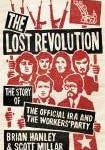The Lost Revolution: the story of the Official IRA and the Workers’ Party, is a riveting tale, but it underplays their influence on the British Labour movement, says Gary Kent.
The Troubles have produced a vast library but this is the first major history of an overlooked but influential movement: the Official IRA and the Workers’ Party, dubbed the Sticks after ditching pin-on Easter Lilies in favour of adhesive backing.
Drawing on many interviews and official archives, it readably narrates this movement’s journey over three bloody decades from the priority of forcibly uniting Ireland to abandoning armed struggle and opposing terrorism but never decommissioning its weapons.
It also moved from opposing “the Communist menace” to embracing class politics with a distinct Stalinist tinge – their bookshops held the Irish franchise for Soviet literature and WP members were allowed free Soviet health treatment.
The authors write that the WP played “a large part in the death of irredentist ideology in the south” and “served as the training ground for much of the leadership of the present-day Labour Party and trade unions in the South. The revolution it struggled for, through violence and political activism, never took place; but the struggle shaped modern Ireland.”
That history was tainted by its military wing – the Official IRA (OIRA) which went from opposing the B Specials to becoming what was known internally as Group B and whose various “special activities” were justified by a “revolutionary morality”. Stalin was a bank robber too.
The book covers the then united IRA’s futile border campaign of 1956-62 to the rise of “the Army of the People” with increased social agitation – fish-ins at aristocratic
estates, attacks on strike-breakers, housing action and exposing corrupt “gombeen Ireland”. It details the emergence of the civil rights movement, the IRA split in 1969 (helped by the Irish establishment which feared the Marxists more than the Provos) and lethal rivalries with the Provos and others. Then to the explosive Hunger Strikes and the growing critique of “Provo- Nazis” and their “black, sullen hatred of Irish Protestants and Protestantism in Ireland”. It ends with the “flight from socialism” – the bitter debate following the collapse of the Soviet bloc on “the necessity of social democracy”.
Passion and bitterness
It is packed with anecdotes and vignettes which bring a sometimes bohemian cast of characters to life in all their camaraderie, passion and bitterness. In May 1972 the OIRA tarred and feathered a Belfast girl for fraternising with British soldiers. Feminist Dr Moira Woods shaved her head and picketed the party in Dublin. Her partner was OIRA leader, Cathal Goulding.
It quotes Gerry Adams, “the thinking man’s Provo”, as saying in Long Kesh, where Provos and Sticks were both interned, that he would “wade up to his knees in Protestant blood” for a united Ireland. Adams strongly disputes this.
The authors incorrectly allege that the New Consensus peace group (in which I was involved) took British funding but promptly gave an unreserved apology. I also worked with WP members in the 1980s and 1990s, and think the book underplays the WP’s influence on the British Labour movement.
The ILP was heavily involved in work on Northern Ireland and sent two delegations to the North as guests of the WP which insisted that we met all relevant parties rather than just taking their word for it. Some of us saw how their intervention, along with our own, helped change the terms of debate in Britain.
In 1985 the Sticks introduced their daily Irish Social Nights at Labour’s annual conference with left-wing songs, patter and a bit of craic. These events became popular with a wide audience, conveyed the complexities of Northern Ireland, challenged the Provisionals and influenced policy-makers. It helps explain why more British left became neutral on the national question, which helped Labour to conclude the Belfast Agreement.
The Sticks had to split in the end. It was increasingly untenable to maintain a Leninist regime and electoral credibility with a “little secret army” in tow. WP parliamentarians tried to purge the party of Stalinism and republicanism but narrowly lost and formed the Democratic Left which finally merged with the Irish Labour Party.
It’s a riveting tale, and resource, but key speeches and articles should have been included, and the index isn’t inclusive. It’s difficult to keep readers interested in the rhythms of a politico-military movement – paper sales, robbery proceeds, funerals, casualties, tit-for-tat murders, characters, splits and intrigues – but this enjoyable history does it well.
The Lost Revolution: the story of the Official IRA and the Workers’ Party, by Brian Hanley and Scott Millar, is available from Penguin for £20.
www.penguin.co.uk/nf/Book/BookDisplay/0,,9781844881208,00.html

Gary Kent’s review has sparked a long discussion on the Irish political site, the Cedar Lounge Revolution.


